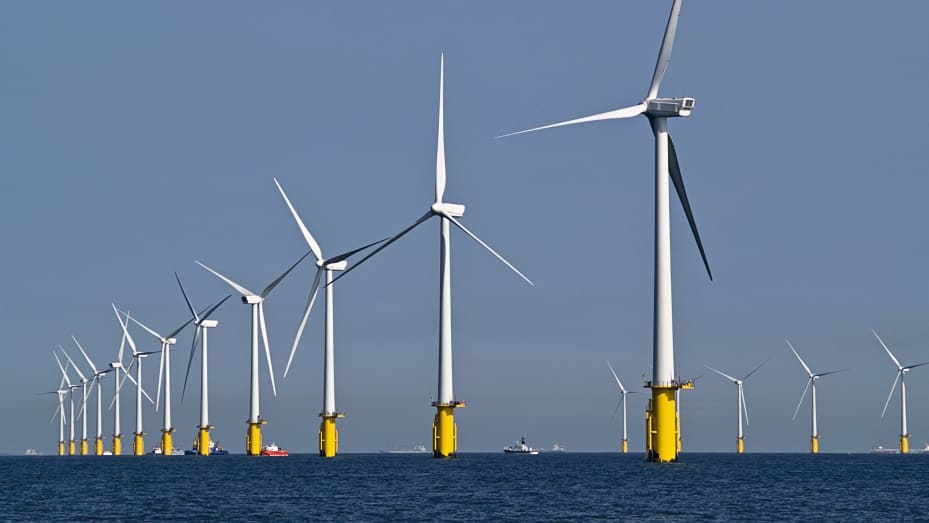Green energy fantasies will bankrupt Britain
News & Social Media / Post
There is zero chance of making renewable energy work

Rachel Reeves of the Labour Party tweeted yesterday that “There is no reason that the UK shouldn’t be a world-leading clean energy superpower by 2030. But the Tories are holding us back. Labour will create jobs, slash energy bills for good, and make the UK energy independent, freeing us from the actions of dictators”.
We would like to know what on earth she is smoking. There are plenty of reasons why the UK cannot be a “clean energy superpower”. The establishment have been pushing this shtick for the last twenty years and if it was going to create all these jobs we’d have seen some evidence of it working. There has been no green industrial revolution. There has been no green growth. It has utterly failed to regenerate Hull, Grimsby, Hartlepool and Lowestoft. Renewable energy has only succeeded in making our energy supply more expensive and less reliable.
The wind energy lobby has relentlessly pushed the message that wind energy is nine times cheaper than fossil fuel alternatives, but that simply isn’t the case. They only refer to the strike price of wind without accounting for the costs of having to accommodate intermittent energy on the grid. The national grid was never designed to cope with intermittent diffuse energy. We spend a billion annually just trying to balance the grid. Wind farms are paid to shut down when it’s too windy and we pay conventional plant to power down when the wind is blowing.
Part of the problem is grid congestion for which there is no economical solution. An estimated £54bn is needed in grid upgrades is needed in order to add new wind capacity to the system – but the wind lobby excludes that from their quoted price per MWh. The “upgrades” will be funded by general network transmission charges. We will never see an honest cost assessment of wind from the green lobby.
Furthermore, to meet a target of 2030, we would need to see a four-fold increase in operational capacity. This simply isn’t going to happen. Even though new capacity is in the pipeline, many existing wind farms are approaching their end of their operational life. We can extend the lifespan of conventional plant, but wind turbines need complete replacement.
Offshore turbines, in the highly aggressive environment of our coastal waters, have a lifespan of 20-25 years, after which they are no longer safely functional – and even that lifespan estimate may be optimistic. Within each early-model turbine, there exist thousands of components and parts that have worn down, been replaced and fixed without estimates on their installation time frame. These are already nearing the end of their life expectancy.
From a study led by the University of Kent published in February of last year, it was estimated that the UK must decommission approximately 300 and 1600 early-model offshore wind turbines by 2025 and 2030, respectively. From the fleet of 2,292 turbines, therefore, the majority will need replacement by 2030.
Furthermore, as the turbines exceed their safety remit, the sector is also set to lose the unique skillset of engineers that originally installed and maintained these early models, as they are now approaching professional retirement. With a combination of these factors, it is anticipated that the additional requirement could significantly slow the growth of the renewable energy sector. And, of course, with each passing year, more turbines will need to be replaced – for which no provision seems to have been made.
Once operational, the problems don’t stop there. While the government’s projection for installed capacity might be set at 40GW by 2030, actual output varies considerably. The lower range resides at percentages in the high 30s, and only in one experimental unit is a figure close to 60 percent achieved – in the extreme north of Scotland, conditions which are unlikely to be replicated elsewhere. The average load factor for the entire offshore fleet is somewhat optimistically set at 40 percent which means that, even if the target of 40GW is reached, the actual availability will stand at 16GW.
Unsurprisingly, the onshore fleet delivers considerably less so that, in real world conditions, the 24.1GW of installed wind capacity only delivered 5.58GW in the last year – despite the National Grid giving preference to renewables production. Within the average figures, though, are concealed a multitude of sins. Normal operational fluctuations in power production range from 2-300 percent, requiring a massive balancing operation to ensure that supply matches demand. The greater the contribution of wind power, the harder (and more expensive) it is to keep the system balanced.
Net Zero advocates insist that these technological flaws can be overcome with energy storage solutions, but these solutions simply cannot plug the capacity gap created by wind intermittency. We would need vast battery capacity to keep the system running even for a few minutes. Thus, the Net Zero transition isn’t so much a transition away from fossil fuels rather it is a transition to a mineral intensive system – just when the global supply of rare earth minerals and metals is skyrocketing – and when China most of the world’s stockpiles.
Even if we could say that battery technology was viable, there is now massive global competition for resources as the world’s automotive manufacturers are switching to EV production. The battery industry simply cannot keep pace with demand nor can it count on stable supply chains. Meanwhile, rising energy costs have delayed major construction works at Britishvolt’s North East gigafactory. It may never start production.
Other solutions to the balancing problem include hydrogen, but the idea of replacing a significant share of conventional energy in the order of TWh with hydrogen does not stand up to scientific analysis. Hydrogen technology faces efficiency disadvantage in power storage race (with the usual caveat that it will work eventually if we throw countless billions at it) – but it will never get past loss-making demonstrator projects.
Nobody is able to tell us just how much the cost of mitigating renewable intermittency is likely to cost and when such technologies will be available at scale. The numbers looked sketchy even before Covid and the war in Ukraine. So we now have to ask if it’s just cynical political spin on the part of Labour, or whether Rachel Reeves genuinely believes what she’s saying? If so, then it suggests she hasn’t conducted even cursory research on the feasibility of this policy. The claim we can “slash bills” with renewable energy is beyond ridiculous.
The cold reality is that even if Net Zero were desirable, it’s not something that can be rushed, and any energy policy incorporating Net Zero ambitions needs a long term interim solution. New nuclear won’t come on stream for another decade. We need a policy for the here and now – and that means exploring every available option. Fracking is certainly part of the solution, but it may not yield results in time. We need to explore coal bed methane options and rethink our phobia of new coal power stations.
In essence there is no difference between Labour’s witless energy policy and that of the incumbent government. Each of the mainstream parties have played their part in bringing the British energy grid to its knees. The Tories are ultimately responsible for failing to renew gas storage and Labour wouldn’t have done anything differently. They allowed their climate virtue signalling to take precedence over the need to keep the lights on. Now they're doubling down on stupid.
Recent National News











